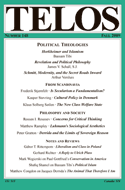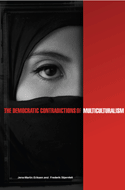By Michael Millerman · Tuesday, April 30, 2013 As an occasional feature on TELOSscope, we highlight a past Telos article whose critical insights continue to illuminate our thinking and challenge our assumptions. Today, Michael Millerman looks at Frederik Stjernfelt’s “Secularism is Fundamentalism! The Background to a Problematic Claim,” from Telos 148 (Fall 2009). Frederik Stjernfelt and Jens-Martin Eriksen’s The Democratic Contradictions of Multiculturalism is also available from Telos Press in our online store.
 What Leo Strauss demonstrated in his studies on the foundations and crisis of liberalism—an achievement that continues to bring both honor and infamy to his name—recurs in the guise of an unsolved problem in both the popular press and in learned company as a debate over the question of whether secularism is what it ostensibly opposes: a rigid fundamentalism. In these circles, the question is provoked less by purely theoretical considerations than by such utterances in the public sphere as are bound to infuriate a sect’s opponents, or confirm them in their suspicions: the Christian American Family Association‘s director of issues analysis refers to “secular fundamentalists” as “the American Taliban”; Quebec Cardinal Marc Oullet, who had a chance to become Rome’s new Pope, complains of “secular fundamentalism” and the “dictatorship of relativism” when defending the Catholic faith; the inquisitor Simon Blackburn quips that a recent book by an established and respected philosopher, who questions the materialistic atheism of the day, ought to be blacklisted as prohibited reading. What Leo Strauss demonstrated in his studies on the foundations and crisis of liberalism—an achievement that continues to bring both honor and infamy to his name—recurs in the guise of an unsolved problem in both the popular press and in learned company as a debate over the question of whether secularism is what it ostensibly opposes: a rigid fundamentalism. In these circles, the question is provoked less by purely theoretical considerations than by such utterances in the public sphere as are bound to infuriate a sect’s opponents, or confirm them in their suspicions: the Christian American Family Association‘s director of issues analysis refers to “secular fundamentalists” as “the American Taliban”; Quebec Cardinal Marc Oullet, who had a chance to become Rome’s new Pope, complains of “secular fundamentalism” and the “dictatorship of relativism” when defending the Catholic faith; the inquisitor Simon Blackburn quips that a recent book by an established and respected philosopher, who questions the materialistic atheism of the day, ought to be blacklisted as prohibited reading.
Continue reading →
By Telos Press · Friday, June 29, 2012 Jean Lassègue reviews Jens-Martin Eriksen and Frederik Stjernfelt’s The Democratic Contradictions of Multiculturalism, now available in English translation from Telos Press.
 The subject of Jens-Martin Eriksen and Frederik Stjernfelt’s book is the concept of multiculturalism and how it relates to organized religions conceived as purveyors of norms in the public sphere. If, in order to justify this approach, one were to draw a comparison with the famous analytical framework conceived by Karl Polanyi in The Great Transformation, which demonstrated that as from the second half of the 19th century, the economy had striven to absorb society instead of being governed by it, one might ask oneself if the question today is not whether religions are attempting the same endeavor, beyond the secular episode which slowly took shape in Europe until it prevailed in the 20th century, by trying to reverse society’s independence from any kind of external metaphysical foundation seeking to encompass it. From this standpoint, the examination of the relationships between Islam and multiculturalism takes up a significant part of the book, precisely because Islam is the only religion that to this day views its sphere of action as encompassing society and as including a proselytic component, an outlook which Christianity and Buddhism would (maybe temporarily) seem to have renounced. One can therefore readily understand the author’s chosen angle of approach, which bears for the most part on the place that should be afforded to organized religions, and especially to Islam, in the public sphere of liberal democracies at the highly specific point in their history where collective debate has progressively crystallized around the question of multiculturalism. The subject of Jens-Martin Eriksen and Frederik Stjernfelt’s book is the concept of multiculturalism and how it relates to organized religions conceived as purveyors of norms in the public sphere. If, in order to justify this approach, one were to draw a comparison with the famous analytical framework conceived by Karl Polanyi in The Great Transformation, which demonstrated that as from the second half of the 19th century, the economy had striven to absorb society instead of being governed by it, one might ask oneself if the question today is not whether religions are attempting the same endeavor, beyond the secular episode which slowly took shape in Europe until it prevailed in the 20th century, by trying to reverse society’s independence from any kind of external metaphysical foundation seeking to encompass it. From this standpoint, the examination of the relationships between Islam and multiculturalism takes up a significant part of the book, precisely because Islam is the only religion that to this day views its sphere of action as encompassing society and as including a proselytic component, an outlook which Christianity and Buddhism would (maybe temporarily) seem to have renounced. One can therefore readily understand the author’s chosen angle of approach, which bears for the most part on the place that should be afforded to organized religions, and especially to Islam, in the public sphere of liberal democracies at the highly specific point in their history where collective debate has progressively crystallized around the question of multiculturalism.
Continue reading →
|
|
 What Leo Strauss demonstrated in his studies on the foundations and crisis of liberalism—an achievement that continues to bring both honor and infamy to his name—recurs in the guise of an unsolved problem in both the popular press and in learned company as a debate over the question of whether secularism is what it ostensibly opposes: a rigid fundamentalism. In these circles, the question is provoked less by purely theoretical considerations than by such utterances in the public sphere as are bound to infuriate a sect’s opponents, or confirm them in their suspicions: the Christian American Family Association‘s director of issues analysis refers to “secular fundamentalists” as “the American Taliban”; Quebec Cardinal Marc Oullet, who had a chance to become Rome’s new Pope, complains of “secular fundamentalism” and the “dictatorship of relativism” when defending the Catholic faith; the inquisitor Simon Blackburn quips that a recent book by an established and respected philosopher, who questions the materialistic atheism of the day, ought to be blacklisted as prohibited reading.
What Leo Strauss demonstrated in his studies on the foundations and crisis of liberalism—an achievement that continues to bring both honor and infamy to his name—recurs in the guise of an unsolved problem in both the popular press and in learned company as a debate over the question of whether secularism is what it ostensibly opposes: a rigid fundamentalism. In these circles, the question is provoked less by purely theoretical considerations than by such utterances in the public sphere as are bound to infuriate a sect’s opponents, or confirm them in their suspicions: the Christian American Family Association‘s director of issues analysis refers to “secular fundamentalists” as “the American Taliban”; Quebec Cardinal Marc Oullet, who had a chance to become Rome’s new Pope, complains of “secular fundamentalism” and the “dictatorship of relativism” when defending the Catholic faith; the inquisitor Simon Blackburn quips that a recent book by an established and respected philosopher, who questions the materialistic atheism of the day, ought to be blacklisted as prohibited reading.  The subject of Jens-Martin Eriksen and Frederik Stjernfelt’s book is the concept of multiculturalism and how it relates to organized religions conceived as purveyors of norms in the public sphere. If, in order to justify this approach, one were to draw a comparison with the famous analytical framework conceived by Karl Polanyi in The Great Transformation, which demonstrated that as from the second half of the 19th century, the economy had striven to absorb society instead of being governed by it, one might ask oneself if the question today is not whether religions are attempting the same endeavor, beyond the secular episode which slowly took shape in Europe until it prevailed in the 20th century, by trying to reverse society’s independence from any kind of external metaphysical foundation seeking to encompass it. From this standpoint, the examination of the relationships between Islam and multiculturalism takes up a significant part of the book, precisely because Islam is the only religion that to this day views its sphere of action as encompassing society and as including a proselytic component, an outlook which Christianity and Buddhism would (maybe temporarily) seem to have renounced. One can therefore readily understand the author’s chosen angle of approach, which bears for the most part on the place that should be afforded to organized religions, and especially to Islam, in the public sphere of liberal democracies at the highly specific point in their history where collective debate has progressively crystallized around the question of multiculturalism.
The subject of Jens-Martin Eriksen and Frederik Stjernfelt’s book is the concept of multiculturalism and how it relates to organized religions conceived as purveyors of norms in the public sphere. If, in order to justify this approach, one were to draw a comparison with the famous analytical framework conceived by Karl Polanyi in The Great Transformation, which demonstrated that as from the second half of the 19th century, the economy had striven to absorb society instead of being governed by it, one might ask oneself if the question today is not whether religions are attempting the same endeavor, beyond the secular episode which slowly took shape in Europe until it prevailed in the 20th century, by trying to reverse society’s independence from any kind of external metaphysical foundation seeking to encompass it. From this standpoint, the examination of the relationships between Islam and multiculturalism takes up a significant part of the book, precisely because Islam is the only religion that to this day views its sphere of action as encompassing society and as including a proselytic component, an outlook which Christianity and Buddhism would (maybe temporarily) seem to have renounced. One can therefore readily understand the author’s chosen angle of approach, which bears for the most part on the place that should be afforded to organized religions, and especially to Islam, in the public sphere of liberal democracies at the highly specific point in their history where collective debate has progressively crystallized around the question of multiculturalism. 

